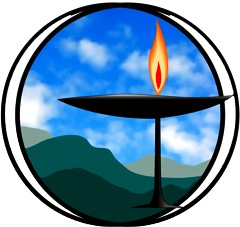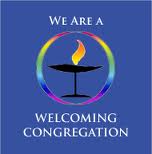Presenters
Index Page
Barker, Geraldine
Bodner, Mark
Burton, Laura
Castleberry, Kasey
Davis, Sam
Davis, Terry UU minister
Frost, Edward UU minister
Kibler, Myra
Nicholson & Brown
Sally Pamplin
Robison, Gerald
Seidman, Karl
Sheber, Larry
Sherod, Bob
Simmons, Antoine
Tremblay, Alexandra Immunologist
Waddell, Donna
Walker, James
West, Herb & Myrna
Woehr, Terry
Wood, Bruce
Other Sources
A Celebration of Joy
by Kasey Castleberry
Presented 2012 April 01 to the congregation of Mountain Light Unitarian Universalist Church in Ellijay GA.
Once upon a time and not so very long ago, I was so riddled with anxiety that I would have been unable to stand here before you as a service leader, much less the principal speaker. My journey into joy changed all of that. Mind, I can still hear faint murmurings of anxiety within me, but I no longer give them energy, thus denying them a voice. Hopefully, today will not be an exception. So, I call upon the Spirit of Life and of Joy, to guide me in this eternal, blessed moment…
Somewhere over the rainbow, blue birds fly
Birds fly over the rainbow, Why then, oh why can't I? 1
I first heard Judy Garland sing those words as Dorthy Gale, in the 1939 Film, Wizard of Oz. Dorthy had been told by Auntie Em to go and "find yourself a place where you won't get into any trouble." 2
Shortly thereafter, Dorothy muses to her little, rambunctious dog: "Someplace where there isn't any trouble. Do you suppose there is such a place, Toto? There must be…", and then she breaks into that beautiful song.
For many listeners, Somewhere over the Rainbow speaks to the melancholy in which we so often find ourselves. It, also, reminds us how we either instinctively know (or at least hope) that there is somewhere and some time where we will be happy. How about you? Can you remember, in your own dark moment, long ago or recently, longing for a land that you heard of, once in a lullaby?
In a letter to Harold Arlen, the song's composer, Ms. Garland wrote:
Over the Rainbow has become part of my life. It's so symbolic of everybody's dreams and wishes that I'm sure that's why some people get tears in their eyes when they hear it. 3
I must confess, I was one of those teary-eyed dreamers. I can remember identifying with Dorthy, ever looking for happiness somewhere over the rainbow, longing for a world of wonder and brilliance, instead of the shades of gray in which I was living.
Though I much prefer the book, I do like the moral of the movie. It is not the situation in which you find yourself that is important, it is how you choose to look at it that matters. Just like Dorothy, we all can find joy in the most unlikely places, if we sincerely are willing to look.
Before I can tell you about my journey into Joy, however, I should first try to answer an important question… Is Joy and Happiness the same thing?
"Happiness", as defined by Dictionary.com, is the quality or state of being happy. It is good fortune, pleasure, contentment, joy. 4
As you might suspect, many of the definitions that I found for "happiness" linked it with the word "joy". In fact, it is commonplace to treat "happiness" and "joy" as synonymous terms.
Originally, however, a great majority of the European words for "happy" had the meaning of "lucky". For instance, our word "hap" (as in "hap and circumstance") comes from Middle English and has the meaning "chance" or "fortune", and the word "happy" meant "lucky". 5
An example of this is the phrase, "happy as a clam", which dates back to the early 1600s. Originally, the phrase was "happy as a clam in the mud at high tide, when it can't be dug up and eaten." Is anyone surprised that was shortened?
Essentially then, "happy" implies a lucky or fortunate situation that leads to the feeling, showing, or expressing joy. 6 The aforementioned happy clam, therefore, expresses joy as a result of a particular situation, in this case a non-event. That is, it is pleased at its good fortune of NOT being invited to the clam bake.
If happiness is a temporary expression of joy, then what is "joy"? In English, we acquired the word in the early 13th century from the Old French "joie" meaning "feeling of pleasure and delight". 5 I think of Joy as a Platonistic Form, that is, an intangible, divine ideal, from which material expressions manifest. To me, Joy is a vast ethereal plane to which we have ephemeral access, mostly through events which we perceive to be lucky or fortunate.
The Christian website, Awakenings, puts it this way:
The "happiness that lasts" is never found because it is actually impossible to get happy and stay happy. If life is based on obtaining happiness, then we will always fall short because life is always changing as the wheel turns.
It is far better to seek "joy". Joy is related to happiness, but it is a deeper experience. In the search for happiness the individual focuses upon himself, but joy moves a person out of a self-centered preoccupation and provides an orientation towards others. Joy is an experience which connects us to that which is "Greater" than we are. It connects us to the creative power that is more than the "I" or ego. 7
That quote is very similar to the Zen teachings of Charlotte Joko Beck, the author of Nothing Special: Living Zen, which our book group read last year. Joko said:
Body tension will always be present if our good feeling is just ordinary, self-centered happiness. Joy has no tension in it, because joy accepts whatever is as it is. 8
As I like to put it: Happiness is situation dependent, and Joy is a state of being. Put another way, happy people tap into Joy. Joyous people live within it.
For me, Joy is the Divine embrace. I believe that we all are so deeply loved by that which created us, whether you call it God or Nature or whatever, that if we but surrender to Love, we can know nothing but Joy, even in sad moments and in hardship.
Clearly, having such a lofty definition of Joy predicates that Practicing Joy must be a part of one's spiritual journey. For me it is, and I have always been Practicing Joy. You see, it is a never-ending process within this glorious, eternal moment which is the magnanimous now. This is when some of my friend's would roll their eyes and say, "Oh, no, he's talking again."
It might help to understand that I believe in a spherical reality, that we are always in the "here and now". "Then and there" are simply illusions, but for the benefit of those here who insist in believing that time is linear (and you know who you are), let me pretend to follow the precepts of our shared reality and say instead… I had been contemplating Practicing Joy for years before actually beginning it.
In mundane terms, the problem that prevented me from trying it earlier, was that I thought that it would be too difficult. After all, anyone can be happy for some period of time, however prolonged or short it may be, but happiness always ends. Too often it ends in anguish.
That all changed for me on the morning of 2010 October 10. 10-10-10, a curious thing that, but I do not believe in coincidence, per se. Anyway… It was a Sunday, and I was up early, having spent a long, dark night in utter despair. Ill health, disheartening personal interactions, and numerous difficulties finally had gotten the best of me. I was completely defeated and ready to surrender.
My addiction to searching for happiness had the hopeless goal of finding the Good Life, to which my mentors had pushed me, those being the unhappy, dead Greeks, mainly Plato and Socrates. My search had failed so miserably, that my despair could no longer find even the slightest hint of happiness in the world. No fix. No hope.
That fateful morning, I decided that I would lock myself away from friends and family, I would quit my congregation, and I FINALLY would ask my doctor for anxiety medication… I would admit my failure… OR… I could try that silly Happiness Project that I had been contemplating for years.
Simply put, desperation had led me to a point where I no longer had anything to loose. So, I played a favorite coping game of mine, which I like to call the "Worse Case Scenario". If I failed and things continued to grow more and more unbearable, I would be seeing my doctor in a couple of weeks anyway. I would ask for pharmacological assistance.
So why not try it? At least I would know once and for all if I could ACTUALLY create my own reality through conscious choice, rather than simply creating it by default. I deeply believe in this premise and needed to see it manifest.
You may have noticed that when I first started the practice, I referred to it as my Happiness Project. I did this because I began by deliberately focusing on being happy; however, I did not choose a happy memory, I chose a happy feeling. I would focus upon this feeling whenever I caught myself straying into an unhappy moment. Essentially, I became mindful of happiness, and that was the key to becoming Joyful.
It was sometime later that I realized that it was Joy, not happiness, in which I was dwelling. This is where the distinction of focusing upon a feeling rather than a remembered event comes into play. Situations make us happy. Joy is the underlying state to which that happiness connects.
In spite of my increased Joy, many of my friends repeatedly warned me that my project was doomed for failure. Had I been reaching for happiness, which is dualisticly infused, instead of joy, I would have failed. Dualism requires a balanced equation. For every moment of happiness, I would need an equal portion of unhappiness.
Fortunately, joy is not dualistic. It is an expression of the Divine, like Warmth, like Light, like Love. They have no opposites of which a balance is required. They only have degrees of being known, of being embraced. Despair, Coldness, Darkness, and even Hate are not the opposites of their counterparts. They are the absence of Joy, of Warmth, of Light, and of Love. They are states in which we have chosen NOT to embrace our creation fully. They are, in my most humble opinion, a denial of our higher nature, a separation from God.
Of course, in my belief system, NOTHING can be separated from All That Is, but we can deny our divine nature and build imaginary walls around us, which gives us the comforting illusion of alone-ness.
On that fateful October morning, I decided the time had come to dissolve those walls, and I let them evaporate into the great mysterious mist of possibility from which they came, and at last I felt the joyful embrace that had held me all along. I was instantly healed. Maybe not completely, but enough that I was noticeably changed.
As my journey into Joy continues, I have expanded my appreciation of gratefulness, love of life, seeing the worth and dignity in all persons and all things. I even learned to love myself in the process. Yes, I can even love this deluded old fart who thinks he is just a young pup, still adorable and cute, even if my mirror would have me believe otherwise. Silly mirror.
So, if you are unhappy and want to find joy, here are some things that you should stop doing immediately:
- Stop trying to make things perfect.
- Stop holding on to the past, especially old grudges.
- Stop focusing on what you DO NOT want to happen.
- Stop complaining and feeling sorry for yourself.
- Stop being jealous of others.
- Stop blaming others for your troubles.
- Stop looking to others for your happiness.
- Stop letting others bring you down to their level.
- Stop wasting time explaining yourself to others.
- Stop trying to be someone you are not.
Better yet, be mindful of the the beauty in small moments. Feel the joy therein, and that Joyful vibration will attract more joyful moments. It is simple physics. Likenesses attract.
If I forget to be mindful of my joy and doubt rises up within me, whispering in my ear that I am no one special, asking me who am I to dare to speak my personal Truth. I try to remember the wisdom of Marianne Williamson. She said:
Our deepest fear is not that we are inadequate. Our deepest fear is that we are powerful beyond measure. It is our light, not our darkness that most frightens us. We ask ourselves, Who am I to be brilliant, gorgeous, talented, fabulous? Actually, who are you not to be? You are a child of God. Your playing small does not serve the world. There is nothing enlightened about shrinking so that other people won't feel insecure around you. We are all meant to shine, as children do. We were born to make manifest the glory of God that is within us. It's not just in some of us; it's in everyone. And as we let our own light shine, we unconsciously give other people permission to do the same. As we are liberated from our own fear, our presence automatically liberates others. 9
So, if your life's journey leads you to a place of desperation where you doubt or fear your own magnificent power, and joy of your divine nature seems like a distant memory, do not forget that you create your own reality. As my pal Seth-Roberts says, "the point of power is in the present." 10 Give yourself permission, therefore, to let you own light shine now and always. Remember…
Somewhere over the rainbow, Skies are blue,
And the dreams that you dare to dream, Really do come true. 1
Note: I credited the quote by Marianne Williamson to Nelson Mandela during the delivery. I originally found it incorrectly credited online. This is a common error for some reason. Ms. Williamson said, "Several years ago, this paragraph from A Return to Love began popping up everywhere, attributed to Nelson Mandela's 1994 inaugural address. As honored as I would be had President Mandela quoted my words, indeed he did not. I have no idea where that story came from, but I am gratified that the paragraph has come to mean so much to so many people." (http://en.wikiquote.org/wiki/Marianne_Williamson)
Footnotes
1 Somewhere Over the Rainbow. Music by Harold Arlen. Lyrics by Harburg. 1939.
2 Wizard of Oz. Produced by Metro-Goldwyn-Mayer. 1939.
3 The Wonderful World of Oz Documentary – The Wizard of Oz (3-Disc Collector's Edition DVD, 2005). (http://en.wikipedia.org/wiki/Somewhere_Over_the_Rainbow)
4 Dictionary.com, LLC. 2012. (http://dictionary.reference.com/browse/happiness?s=t)
5 Harper, Douglas. Online Etymology Dictionary, 2010.
6 Collins English Dictionary – Complete & Unabridged. 10th Edition, 2009. William Collins Sons & Co. Ltd., 1979, 1986. HarperCollins Publishers 1998, 2000, 2003, 2005, 2006, 2007, 2009.
7 Awakenings. Happiness or Joy? http://www.lessons4living.com/joy.htm.
8 Beck, Charlotte Joko. Edited by Steve Smith. Nothing Special: Living Zen. 1993. HaperCollins e-books, 2008.
9 Williamson, Marianne. A Return to Love: Reflections on the Principles of A Course in Miracles. 1992. HarperCollins. (http://en.wikipedia.org/wiki/A_Return_to_Love)
10 Seth (Spirit). Channeled by Jane Roberts. The Nature of Personal Reality. Notes by Robert F. Butts. Englewood Cliffs, NJ: Prentice-Hall [1974]. (1973.05.02, Session 660)






